- Home
- Isaac Hooke
Clandestine-IsaacHooke-FreeFollowup
Clandestine-IsaacHooke-FreeFollowup Read online
BOOKS BY ISAAC HOOKE
Thrillers
Clandestine
A Cold Day In Mosul
Military Science Fiction
ATLAS
ATLAS 2
ATLAS 3
Science Fiction
The Forever Gate Compendium
Visit IsaacHooke.com for more information.
CLANDESTINE
A THRILLER
Isaac Hooke
This is a work of fiction. All characters, names, organizations, places, events and incidents are the product of the author's imagination or used fictitiously.
Text copyright © Isaac Hooke 2015
All rights reserved.
No part of this publication may be copied, reproduced in any format, by any means, electronic or otherwise, without prior consent from the copyright owner and publisher of this book.
www.IsaacHooke.com
ISBN-13: 978-0-9947427-0-4
ISBN-10: 0-9947427-0-3
Cover design by Isaac Hooke
Stock image © kaninstudio / Fotolia
Fight where you are needed.
prologue
The rifle cracked and Suleman felt the blood spray his face as the kneeling individual beside him toppled like a discarded sandbag. Sanguine fluid trickled down the flagstones toward the river, joining the blood of those who had fallen before.
Suleman was next in line.
The Sunni militants had captured the lot of them an hour earlier. Waving the black standard of the Islamic State, they had stormed the village and caught the Iraqi army members stationed there at unawares. The militants had proceeded to divide the survivors into two groups by sect, Sunni and Shia. The Sunni were allowed to repent.
The Shia were not.
Suleman heard the balaclava-clad executioner shift behind him.
"I'm Sunni!" he lied. "I repent!"
But it was too late to switch sides.
Allah help me.
There came a moment of absolute stillness. He looked out at the wide river before him, at the reeds, at the blue sky. So peaceful. So beautiful. He would miss it. All of it.
The report of the assault rifle thundered through the air, and Suleman experienced a sharp pain within his right ear. He let himself fall. The paving stones struck his face like a baseball bat but he gave no outward sign that he'd felt the impact. He didn't even flinch. Didn't dare.
The executioner moved on to the next victim and fired. Suleman heard a thud beside him. It was a muffled sound, as his left ear was to the ground, and his right ear seemed deaf entirely. He opened his eyelids a sliver: the lifeless eyes of his friend stared into his own.
Somehow, Suleman had survived. The rifle had missed. Or misfired. Whatever the case, Suleman was alive.
Alive.
Slowly receding in volume as the executioner moved down the line, the relentless crack of the assault rifle continued over the next half hour, with the occasional pause thrown in while the rifleman reloaded. Blood flowed down the flagstones by the truckload.
Suleman didn't move the entire time. He lay there motionless. Waiting. Hoping.
And then the rifle reports ceased.
Suleman dared not get up. Not yet. He remained in place, lying beside his dead companions, baking beneath the hot Iraqi sun, ignoring the flies that dined upon him and the bodies of the dead in macabre swarms. He focused on the pain in his right ear, clung to that agony with all his being. The throbbing reminded him he was still alive.
When darkness finally hid the massacre from watching eyes, Suleman weakly lifted his head. There was no movement around him. Hearing had returned to his right ear, though sound was still muffled through the organ, which pulsed with faint pain.
Suleman scrambled to his knees, hardly able to believe he had survived the day. Why had Allah spared him and no one else?
He turned around to observe the village in the distance and froze.
In the moonlight he saw a man seated cross-legged on the flagstones behind him. An assault rifle rested over his legs. An American-made M16A4.
"Salaam," the man said. "I am Abdullah. Your executioner."
Suleman stared at him in horror.
Abdullah's mouth peeled back in a fierce smile, teeth gleaming in the moonlight. "Is it true what you said earlier? You repent?" The man spoke Arabic with a strange accent, making him difficult to understand.
Feeling a shred of hope, Suleman moved his cracked lips to answer but no sound came. He couldn't even grunt, his throat too parched from lying in the sun all day.
"Nod your head. Yes or no."
Suleman bobbed his chin up and down.
"You are the sniper trained by the Americans?"
Confused as to how the man knew this, again Suleman nodded in assent.
A hard edge came to Abdullah's voice. "If you are lying, you understand what I will do to you, don't you?" His fingers caressed the rifle.
Suleman bobbed his head a third time.
Abdullah handed Suleman a water bottle and he drank greedily. The cool liquid burned his throat. He choked, coughing.
When Suleman had recovered, he tried to speak. "I—" It hurt to talk. He cleared his throat and took another sip. "Repent."
"Good," Abdullah said. "I knew you would. You have risen from the ashes and are reborn. From this moment forth you are no longer a Shia rejector. You no longer believe the successor to the prophet was his own son-in-law. You no longer believe the direct descendants of Muhammad were infallible manifestations of God. Do you understand?"
Suleman nodded fervently. He would agree to anything in that moment.
"Let it not be said that the Caliphate is unmerciful." Abdullah offered him a towel. "Clean yourself up, sniper."
As he took the towel, Suleman suddenly understood the reason Allah had spared him.
To serve that man.
* * *
The unexpected banging at the door startled Habib awake. He rubbed his eyes in the dark and rose from the soft bed.
So far his hegira to the land of the great Caliphate was going very well. He had traversed passport control at Atatürk airport in Istanbul with ease, and had flown to Gaziantep unimpeded. Allah was with him.
All that remained was to meet the smuggler who would take him across the border to Syria. Perhaps that was him at the door?
As Habib reached the entrance, masked gunmen burst inside his hotel room.
Everything happened so fast: before he knew what was happening they had dragged him to the main room and thrown him face down onto the table. While the others held him down, one of the gunmen proceeded to violate him.
"No!" Habib shouted, but it was too late. "No no no."
The pain was manageable, but the indignation, the humiliation...
"You like it, don't you," his torturer said in Gulf Arabic. "You're a homosexual!"
"I'm not!" Habib sobbed.
Cellphone cameras flashed.
"We know what you're planning, boy! We know!"
He glanced at the large, decorative plate at the center of the table, hardly able to see through the tears. He blinked a few times until the image came into focus. The plate was held vertically by a wooden frame. Burnished to a shine, it acted like a mirror. Habib saw the reflection of the masked man who thrust against him repeatedly from behind. An awful sight.
He was about to look away when something else caught his eye. Beyond the violator he saw another gunman dressed in black, standing apart from the others in the hallway.
"I'm not going to be a part of this," the lone man declared in English.
Everything suddenly became clear to Habib.
Americans.
The man in the hallway t
urned to go, but then made a mistake. Perhaps he didn't know he was standing in just the right location for Habib to see his reflection, or perhaps in his hubris he didn't think it mattered, because he pulled off his balaclava.
In that instant those exposed features were forever seared into Habib's memory. Bronzed skin. Gaunt cheeks. Disjointed nose. Tightly-cropped beard. The American could have almost passed for a Gulf Arab.
And then the man stormed from view and was gone.
The terrible violation ended and Habib was thrown into a corner of the room, where he huddled on the floor. Blood trickled down his bare leg.
"Sodomites go to hell, Habib," one of the masked infidels said in Arabic. "What do you think of that?"
Habib could only weep. He was vaguely aware of a strange noise in the background. It sounded like... a printer of some kind?
In a few moments the infidel threw photos on the floor in front of him. "We're going to send these to your family, post them online to the most popular jihad forums, and put them on your Facebook page for all to see. Everyone is going to know you're a sodomite. Everyone. You know what the punishment for homosexuality is where you're going? Or where you're from? You're screwed, boy. In more ways than one."
Habib buried his face in his hands. Allah had abandoned him.
"Of course, none of that has to happen," his masked torturer continued. "If you agree to do certain things for us once you reach Syria."
As Habib listened to what the infidel expected of him, he felt a growing sense of repulsion. He wanted to die. How could Habib betray his beliefs? His brothers? There was no point in living, not if he had to do these things. But like the man had said, Habib would only go to hell when he died.
He decided to do what the torturer asked, if only to defer those eternal fires a while longer. Perhaps someday Allah would grant him vengeance. And maybe, just maybe, Habib might even find a way to reopen the path to paradise.
He thought of the face he had seen in the mirror and smiled. When the Americans least expected it, he would strike.
one
Ethan fingered the Kalashnikov slung over his shoulder. The rifle was a PK-10, an AK-47/AKM clone manufactured by the cottage gunsmiths of the region. Not as good as a factory-produced rifle but it served its purpose.
Roughly two of every ten male passersby carried a gun. PK-10s. Chinese machine guns. Austrian Glock pistols. There was one weapon, however, that almost every man wore without fail, and that was a jambiyah: a large, curved ceremonial dagger tucked into the belt in front of the navel. The hilt was a sign of status. The more expensive hilts were made of ibex or rhino ivory, and depending on craftsmanship, could cost upwards of ten thousand US dollars. Most of the hilts Ethan saw today were of cheap plastic or cow horn.
The men sported white shirts and wraparound sarongs, with black Western-style blazers on top to complete the look. They wore shawls around their heads or shoulders, wrapped and colored in a manner that varied by tribe. Mustaches were prevalent, though the more devout wore beards styled in the mustachless Abe Lincoln fashion.
Men who traveled together frequently held hands in friendship. Almost everyone had golf-ball sized lumps of qat in their cheeks—it was past 3 PM, the end of the workday for many Yemenis, and time to start chewing the amphetamine-rich leaf.
The women wore full veils, with a small slit for the eyes. That, combined with the long black robes draping them from head to foot made them seem like shadowy, roaming ghosts. Some of the older women draped colorful sheets around their existing clothing so that they appeared as strange parodies of the ringwraiths from Lord of the Rings.
Ethan sported a light-green thawb—an ankle-length robe favored by the devout—and wrapped his shawl in the southern fashion. He fit right in with his tanned olive skin and Abe Lincoln beard: for all intents and purposes he was simply another villager who had moved to Sana'a to make a living. He drew the line at qat, however. Ethan had dipped tobacco back in the day, but that was a far more benign habit in his view, considering the dependency effects induced by cathinone, the amphetamine-like compound in qat. Ethan had quit dip cold turkey, and he wasn't about to get himself addicted to something nastier. He padded the inside of his cheek with a substitute made from paper instead.
Even though the city of Sana'a was cloistered in a mountainous valley at an altitude of twenty-two hundred meters, the temperature proved a dry, scorching hundred degrees. Ethan kept to the shade, using the dilapidated stone wall of the Old City as a sunshade. Hawkers who sold wares beneath canopied booths accosted him in harsh, guttural Arabic.
A grubby beggar sat against the wall near a pile of trash and held out a beseeching palm. Ethan placed a crisp pink and green banknote in the man's hand. It was a one thousand rials bill, worth five bucks.
While the beggar thanked him profusely, Ethan pivoted slightly to look back the way he had come. Satisfied that no one was following, he moved on.
He traveled beneath the thousand year old Yemen Gate. Only one vehicle at a time could fit the close-quartered streets, though most of the traffic was pedestrian. The blocky buildings rose as high as nine stories, with outer facades decorated in geometric patterns via strategically placed fired bricks; white gypsum outlined the arched doorways and windows. The upper windows had decorative wooden shutters that allowed unveiled women to look down upon the street without passersby seeing them. Minarets poked up beyond the rooftops, overlapping the yellow-brown mountains that provided backdrop.
Political graffiti was scribbled in Arabic on a few buildings, with such cheerful slogans as "America is the mother of all terrorists" and "Death to Israel," alongside sketches of the Statue of Liberty with a fleet of—presumably hijacked—jumbo jetliners pointed at it.
Ah Sana'a. A place where old and new abutted. Where one could find a bazaar with canopied booths and stalls standing incongruously beside a modern supermarket. Or pass street vendors selling goat kabobs a few doors down from the KFC.
On cue, the call to afternoon prayer filled the air.
"Allahhhhhahhhhhhhahhhhhhhhhoo akbar." The haunting voice of a muezzin drifted through the streets. "Allahu akbar."
There were more than a hundred mosques in the Old City, and they all announced at the same time, using loudspeakers in their minarets to compete for attention, giving the call a strange echo.
The dome of a white mosque, two streets away, poked above the sand-colored buildings. His destination. It was one of the more radical mosques in Sana'a, and its Friday sermons were legendary for their anti-Western rhetoric. Thankfully it wasn't Friday: he wasn't in the mood.
Ethan reached the mosque. Several shoes formed a neat row outside the entrance, with the occasional rifle leaning against the marble wall beside the owner's footwear.
Ethan removed his sandals and set his PK-10 against the wall. There was a tall vase near the entrance, where visitors spat their discarded qat. Ethan scooped the bolus of paper from his mouth with a curved finger and tossed it into the chewed detritus.
He entered, taking his place among the rows of men in the carpeted prayer hall. Women prayed in a separate balcony—they were mildly encouraged to stay home.
When prayers were done, Ethan retrieved his shoes and rifle, and then loitered outside as groups of men gathered for quick chats. He recognized some of the regulars.
A black Land Cruiser abruptly pulled up and three masked gunmen rushed out. They closed on Ethan.
"The rifle!" one of them shouted. "Give it to me!"
Ethan complied.
The others rudely shoved him into the SUV. Someone slid a black hood over his head.
He was jerked back in his seat as the vehicle sped away, tires squealing.
two
The unseen man beside Ethan patted him down and discovered the Android smartphone. The window opened and closed. Ethan guessed the man had tossed out the device.
A short while later the vehicle slowed and Ethan felt the barrel of a nine-millimeter press into his ribcage.
&nb
sp; "Say nothing," the gunman said.
The hood was lifted and Ethan blinked several times while his eyes adjusted. The kidnappers had removed their balaclavas and hidden their weapons. They were tribal men. Tanned, weathered features. Abe Lincoln beards. Mid-twenties.
The Land Cruiser was queued behind several other vehicles at a military checkpoint. The SUV reached the front. Two Yemeni soldiers stood on either side of the Cruiser, while a third kept watch from beside an old-style Soviet BTR-50 armored personnel carrier that blocked the other lane.
"Visiting relatives," the driver told the guard.
M60 machine gun looped over one shoulder, the soldier glanced in the backseat at Ethan and the others, then waved the vehicle forward. When the Land Cruiser was on its way, the kidnappers replaced Ethan's hood.
Half an hour and two checkpoints later the SUV came to a final stop and Ethan was forcibly hauled from the vehicle. As the men escorted him up unseen steps, Ethan couldn't get the image of the recent journalist beheadings from his mind, and he wondered if a similar fate awaited him. He tripped, but the kidnappers caught him and led him onward.
The stairs leveled out and his footsteps soon became muffled—he had passed indoors. The hood was removed.
He stood in a large foyer, relatively austere for its size. Shelves lined the walls, overflowing with Islamic texts. There was a white, immaculate leather sofa near the door.
The kidnappers brought Ethan to a spartan reception room. At the center, twelve young militants, most seeming no older than twenty-five, were gathered on the wooden floor around two individuals in their forties: one of the men was rather portly, while the other was gaunt, his face all bony angles. Seated cross-legged, both of them dressed nearly identically in long white thawbs and headgear, with devout beards. The hilt of the heavier man's jambiyah was crafted from ibex horn, while the lean one had a dagger with an intricate grip of black rhino ivory. Ethan recognized the latter man as Sheik Jasir Al-Khayr, though the big one was unknown to him—likely the owner of the house.

 Warden 2
Warden 2 Devastator
Devastator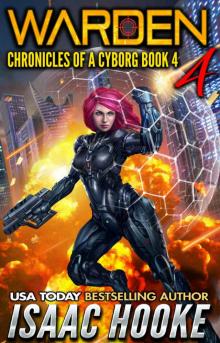 Warden 4
Warden 4 Emperor
Emperor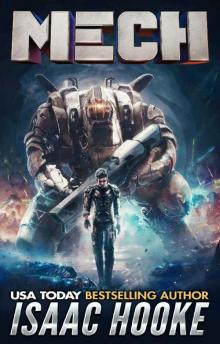 Mech
Mech Conqueror
Conqueror Fighter
Fighter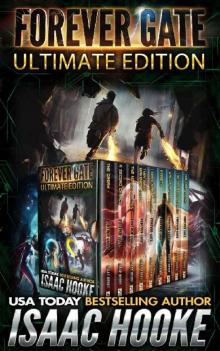 The Forever Gate Ultimate Edition
The Forever Gate Ultimate Edition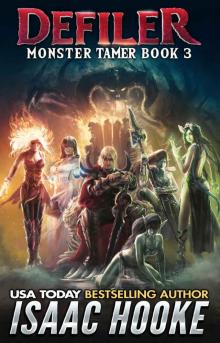 Defiler
Defiler Mech 2
Mech 2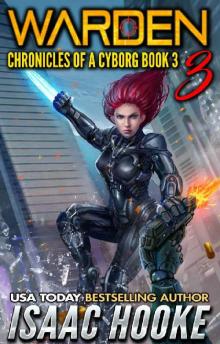 Warden 3
Warden 3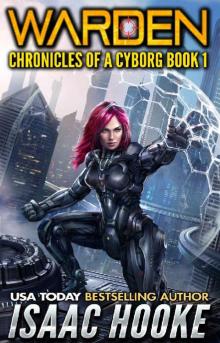 Warden 1
Warden 1 Mech 3
Mech 3 Forerunner
Forerunner The Alliance (AI Empire Book 2)
The Alliance (AI Empire Book 2)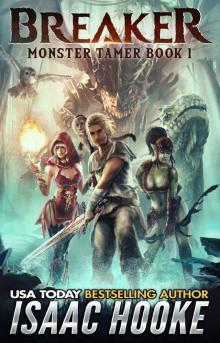 Breaker (Monster Tamer Book 1)
Breaker (Monster Tamer Book 1) Bender of Worlds
Bender of Worlds The Pendulum Swings (The Forever Gate Book 8)
The Pendulum Swings (The Forever Gate Book 8) The Link
The Link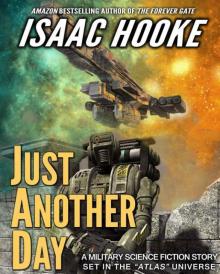 Just Another Day
Just Another Day Star Warrior
Star Warrior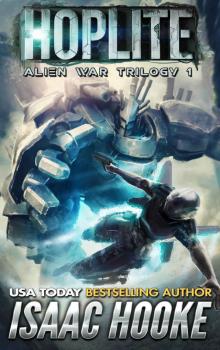 Alien War Trilogy 1: Hoplite
Alien War Trilogy 1: Hoplite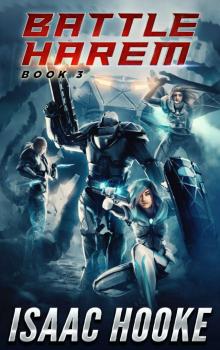 Battle Harem 3
Battle Harem 3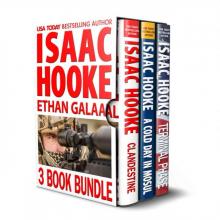 The Ethan Galaal Series: Books 1 - 3
The Ethan Galaal Series: Books 1 - 3 Reloaded
Reloaded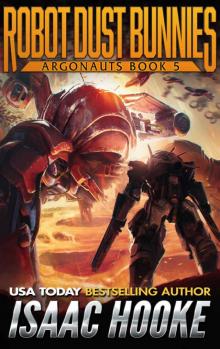 Robot Dust Bunnies (Argonauts Book 5)
Robot Dust Bunnies (Argonauts Book 5) Battle Harem
Battle Harem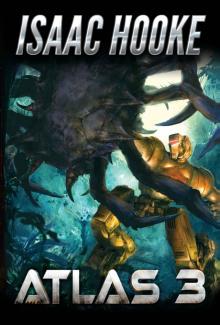 ATLAS 3 (ATLAS Series Book 3)
ATLAS 3 (ATLAS Series Book 3) Argonauts 2: You Are Prey
Argonauts 2: You Are Prey Worlds at War (A Captain's Crucible Book 5)
Worlds at War (A Captain's Crucible Book 5)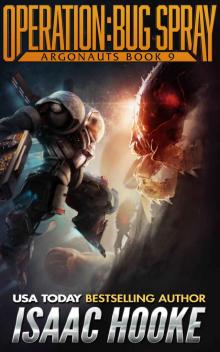 Operation: Bug Spray (Argonauts Book 9)
Operation: Bug Spray (Argonauts Book 9)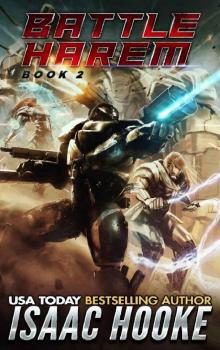 Battle Harem 2
Battle Harem 2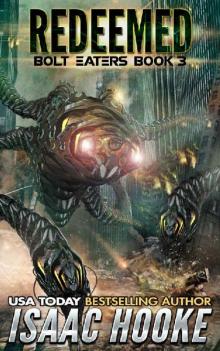 Redeemed (Bolt Eaters Trilogy Book 3)
Redeemed (Bolt Eaters Trilogy Book 3)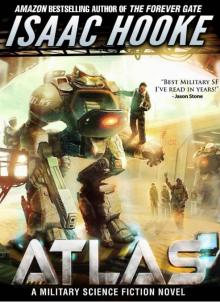 Atlas
Atlas Argonauts 1: Bug Hunt
Argonauts 1: Bug Hunt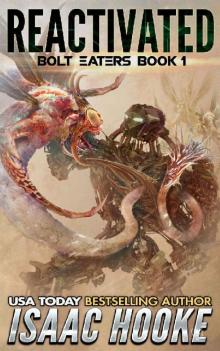 Reactivated (Bolt Eaters Trilogy Book 1)
Reactivated (Bolt Eaters Trilogy Book 1)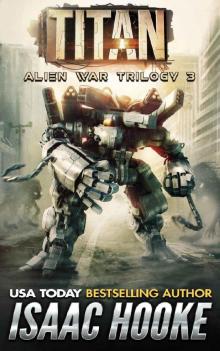 Alien War Trilogy 3: Titan
Alien War Trilogy 3: Titan Flagship (A Captain's Crucible #1)
Flagship (A Captain's Crucible #1)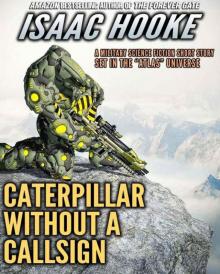 Caterpillar Without A Callsign
Caterpillar Without A Callsign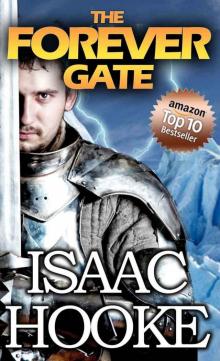 The Forever Gate
The Forever Gate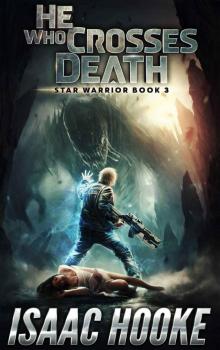 He Who Crosses Death (Star Warrior Quadrilogy Book 3)
He Who Crosses Death (Star Warrior Quadrilogy Book 3)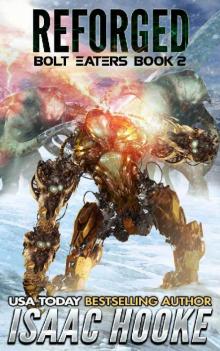 Reforged (Bolt Eaters Trilogy Book 2)
Reforged (Bolt Eaters Trilogy Book 2)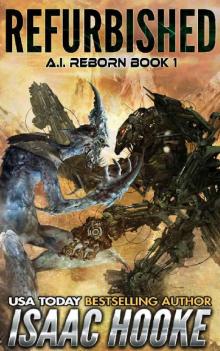 Refurbished
Refurbished Reloaded (AI Reborn Trilogy Book 2)
Reloaded (AI Reborn Trilogy Book 2)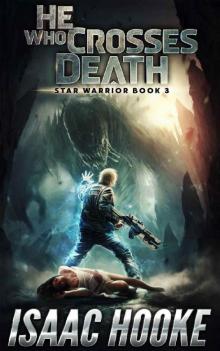 He Who Crosses Death
He Who Crosses Death Explorations: First Contact
Explorations: First Contact Planet Killer (A Captain's Crucible Book 4)
Planet Killer (A Captain's Crucible Book 4)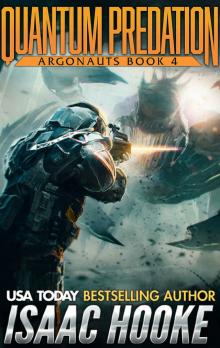 Quantum Predation (Argonauts Book 4)
Quantum Predation (Argonauts Book 4)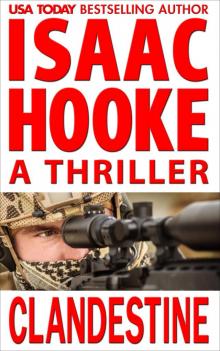 Clandestine-IsaacHooke-FreeFollowup
Clandestine-IsaacHooke-FreeFollowup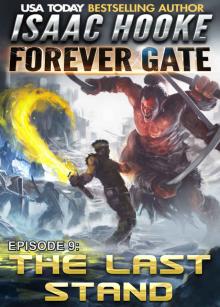 The Last Stand (The Forever Gate Book 9)
The Last Stand (The Forever Gate Book 9)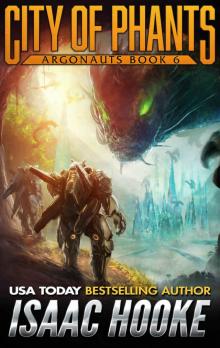 City of Phants (Argonauts Book 6)
City of Phants (Argonauts Book 6) Test of Mettle (A Captain's Crucible Book 2)
Test of Mettle (A Captain's Crucible Book 2)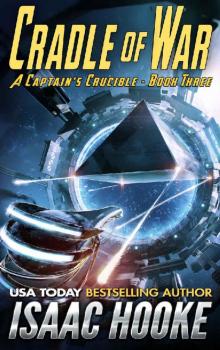 Cradle of War (A Captain's Crucible Book 3)
Cradle of War (A Captain's Crucible Book 3)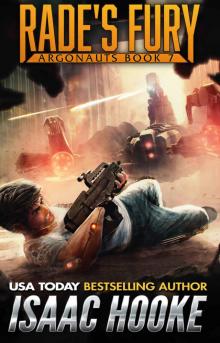 Rade's Fury (Argonauts Book 7)
Rade's Fury (Argonauts Book 7)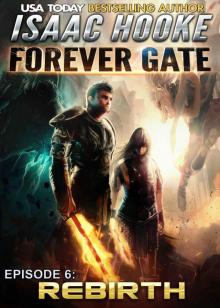 Rebirth (The Forever Gate Book 6)
Rebirth (The Forever Gate Book 6) The Forever Gate Compendium Edition
The Forever Gate Compendium Edition Mechs vs. Dinosaurs (Argonauts Book 8)
Mechs vs. Dinosaurs (Argonauts Book 8)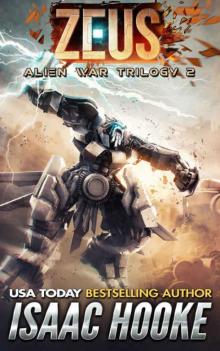 Alien War Trilogy 2: Zeus
Alien War Trilogy 2: Zeus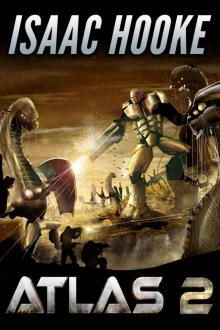 ATLAS 2 (ATLAS Series Book 2)
ATLAS 2 (ATLAS Series Book 2)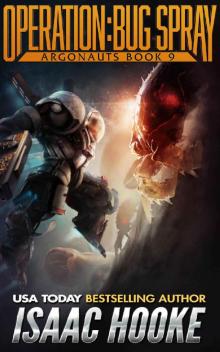 Operation_Bug Spray
Operation_Bug Spray